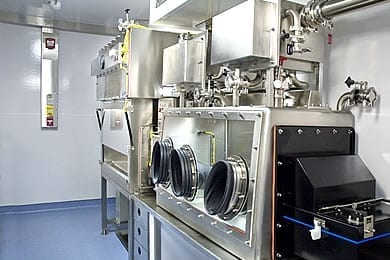A new biological containment laboratory has been officially handed over by the Government of Canada to the Caribbean Public Health Agency (CARPHA). The Biosafety Level 3 (BSL-3) modular laboratory facility is the first of its kind for the Caribbean region.
Located in Port of Spain, Trinidad and Tobago, the laboratory improves diagnostic capacities for human and veterinarian pathogens with high epidemic potential. Manufactured by Germfree, the facility was provided by Canada to CARPHA in cooperation with the Pan American Health Organization (PAHO)/World Health Organization (WHO).
“In our modern age, where global travel is routine and disease knows no boundaries, a well-equipped, safe and secure biological laboratory is an essential tool in the fight against infectious disease,” said His Excellency Mr. Gerard Latulippe, High Commissioner for Canada to Trinidad & Tobago, at the recent laboratory handover event.
“As underscored by ongoing outbreaks of diseases such as the Chikungunya here in the Caribbean, as well as Ebola in West Africa, and the Middle East Respiratory Syndrome (MERS) in the Middle East, isolated disease threats can very quickly become regional or global menaces, presenting serious threats to the health, safety and security of the people of the world,” Latulippe stated.
The biocontainment facility is an initiative of the Biological Security program of Canada’s Global Partnership Program (GPP), which “works to prevent terrorists and states of concern from acquiring or developing biological weapons and related materials, equipment, and technology.”
“When Germfree was approached by Canada’s Global Partnership Program, we were excited to collaborate on this important international project. We worked closely with Canada’s experts in biocontainment engineering and biosecurity,” said Jeff Serle, General Manager of Germfree, US manufacturer of the lab. “GPP challenged us to be creative and innovative in our approach. Energy savings, maintainability and sustainability were key goals for the CARPHA lab.”
“Currently there are several public health events of international concern,” said Dr. Yitades Gebre, Advisor on Family Health and Disease Management, PAHO/WHO. Dr. Gebre referred to reported outbreaks such as Chikungunya virus in the Caribbean, Ebola in West Africa and MERS Coronavirus in the Middle East when speaking at the laboratory handover. “In this regard, having proper laboratory support and services is paramount.”
The biocontainment lab is set up to rapidly identify samples suspected for a diverse range of diseases – including Yellow fever, West Nile virus, Rabies, Hantavirus, Anthrax, drug resistant MTB and emerging infectious diseases with epidemic potential. Advanced containment systems allow personnel to handle other biological-risk agents and materials of unknown origin. Regional biocontainment laboratories play a critical international role. According to Dr. C. James Hospedales, Executive Director of CARPHA, “This is a strategic public health resource for the Americas and the world.”



